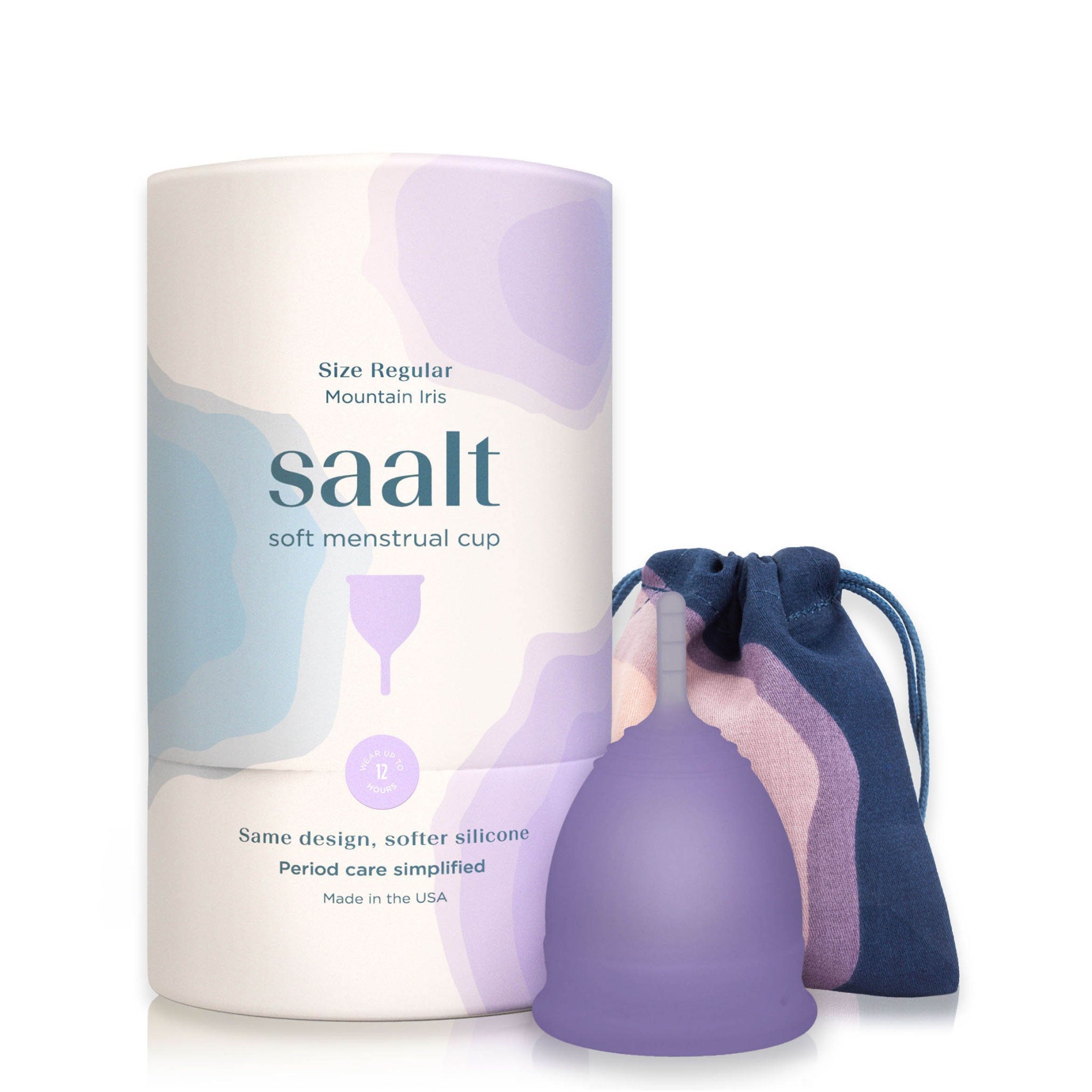Key Takeaways:
- Period Insomnia Is Real: Hormonal shifts, physical symptoms, and emotional stressors can make restful sleep harder to come by during certain phases of the menstrual cycle.
- The Influence of PMDD: Sleep struggles tied to PMDD are valid. Understanding their impact is the first step toward finding support and reclaiming rest.
- Supportive Habits Make A Difference: Simple lifestyle adjustments, better sleep hygiene, and sustainable period care (like Saalt Wear) can help ease insomnia and promote more restorative rest.
Let’s be real. Periods can already feel like enough of a challenge without them throwing off your sleep, too. But if you’ve ever found yourself wired at midnight or waking up more than usual the week before your period, you’re not imagining it. Period insomnia is a common experience, often linked to hormonal shifts, physical discomfort, and increased sensitivity to stress during certain phases of the cycle.
At Saalt, we believe your body deserves support at every hour, day or night. Whether it’s mood changes, cramps, or just feeling a little off, better sleep starts with tuning in to what your body’s asking for. By creating intentional sleep habits, making simple lifestyle shifts, and choosing period care that puts your comfort first, you can feel more grounded, even during your cycle’s most restless moments.
In this article, we’re shedding light on period insomnia, why it happens, and how you can support better rest with small, sustainable changes. Because restful nights and reusable period care aren’t at odds—they go hand in hand, one empowered choice at a time.
What Is Period Insomnia?
If you’ve ever found yourself wide awake the night before your period starts, you’re not alone. Period insomnia refers to difficulty falling asleep, staying asleep, or getting restful sleep, especially in the days leading up to or during your period. It’s a common experience tied to hormonal shifts and physical symptoms, and for many, it shows up like clockwork each cycle.
Why Sleep Gets Disrupted
According to a study from the Cureus Journal of Medical Science, hormones like estrogen and progesterone naturally fluctuate as your body prepares for menstruation. The study notes that a dip in progesterone can make it harder to wind down at night, because it is known to have sedative effects and can help you feel sleepy. At the same time, PMS symptoms like cramps, bloating, breast tenderness, and mood changes may add to your discomfort, creating a perfect storm for a restless night.
When Physical Discomfort Meets Mental Load
Even beyond hormones, period insomnia can be made worse by racing thoughts, nighttime leak worries, or general stress. For some, shifts in body temperature or night sweats play a role, too. It’s not just about being tired; it’s about trying to rest in a body that feels unsettled.
You’re Not Imagining It
Period insomnia is a valid part of the menstrual experience, not just something to push through. Understanding the patterns behind your sleepless nights is the first step toward finding calm and comfort.
The Impact Of PMDD On Sleep Quality
If you’ve ever noticed your sleep quality take a nosedive right before your period, you’re not alone. For some, this goes beyond typical premenstrual syndrome (PMS) and into the realm of premenstrual dysphoric disorder (PMDD). This is a more intense cluster of symptoms that can include mood changes, fatigue, and significant sleep disruptions.
What The Research Shows
According to a study published in the Journal of Sleep Medicine and Disorders, researchers observed that people with PMDD were more likely to experience difficulty falling asleep, frequent night wakings, and non-restorative rest, particularly during the late luteal phase. These sleep issues were often linked to daytime fatigue, reduced alertness, and poor concentration. The study also noted a decreased melatonin response during this phase in individuals with PMDD, suggesting that hormonal shifts may play a role in circadian rhythm disruptions.
Support Starts With Awareness
Understanding the role of PMDD in your sleep cycle can be a powerful step toward compassionate self-care. Simple changes like limiting blue light, eating nutritious meals, and choosing non toxic period products can help restore a sense of balance when rest feels out of reach.
Why Good Rest Matters Even More During Your Period
Emerging research from a journal article published on Oxford Academic shows just how connected sleep and mood really are, especially during your period. In one study of healthy young women with regular menstrual cycles, researchers found that menstrual status alone didn’t determine mood changes. But when sleep quality was taken into account, the story changed.
Sleep Quality And Mood
According to the study, perceived poor sleep was linked to lower positive mood during menstruation, while good sleep helped level out mood no matter what phase of the cycle participants were in. In other words, sleep didn’t just support rest; it helped protect emotional well-being during a time when many experience heightened sensitivity and discomfort.
Sleep Should Always Be A Priority
This reinforces what many people with periods already intuitively know: Sleep isn’t a luxury; it’s foundational. Prioritizing comfort, whether through relaxing routines or choosing soft, breathable period underwear that’s never treated with PFAS, can make a real difference.
If period insomnia has been weighing on your nights and your mood, know that even small changes in sleep habits can offer big support. A good night’s rest might just be your quietest, kindest form of resilience.
Lifestyle Changes For Better Rest
When period insomnia hits, sleep can feel like the first thing to slip away. But intentional habits can help support your body’s natural rhythm, even when hormones make things feel off balance. Here are some easy, practical ways to encourage better rest throughout your cycle:
- Keep A Consistent Sleep Schedule: Waking up and going to bed at the same time every day (yes, even weekends) helps regulate your body’s internal clock. That steady rhythm can make it easier to fall and stay asleep.
- Create A Soothing Bedtime Routine: Your brain needs cues that it’s time to wind down. Think soft lighting, a warm cup of herbal tea, a few yoga stretches, or a couple of pages from a book—whatever helps ease your mind and body into sleep.
- Set A Peaceful Sleep Environment: Keep your bedroom cool, dark, and quiet. Use blackout curtains, try a white noise machine or an instrumental playlist, and lower the thermostat to help your body transition into rest mode.
- Cut Back On Screen Time Before Bed: Blue light from phones and laptops can interfere with melatonin production. Power down devices 30–60 minutes before sleep to help your natural sleep signals do their job.
- Move Your Body (Mindfully): Light movement like walking or yoga can help ease tension and support better sleep. Just try to avoid intense workouts that are too close to bedtime.
- Be Mindful Of Food And Drinks: Eating heavy meals or drinking caffeine too late in the day can disrupt sleep. If you're hungry before bed, choose light, comforting snacks and hydrate earlier in the day.
- Prioritize Comfort: Cramps and sore muscles can make it hard to get comfortable. Support your sleep with breathable bedding, body pillows, and irritation-free layers like period underwear that’s made to move with you.
Better sleep isn’t always instant, but with consistency and care, it’s absolutely possible. Supporting your body with thoughtful rituals and sustainable period care is a quiet act of self-respect. That’s why many choose Saalt’s period panties for worry-free nights, engineered to handle leaks without bulky layers. Our super-absorbent gusset pulls moisture away from the skin, keeping you dry, secure, and comfortable through the night—no pads or tampons required. If you’re still curious how it works, check out our guide on how period panties work.
Additionally, if you need extra coverage or more inclusive sizing options that are actually made for your body, we offer plus size period underwear designed for real comfort without compromising fit or function. Our size range goes from XXS to 4X in most styles, ensuring everyone can have the soft, sustainable support they deserve, no matter their size.
Make The Switch
Period insomnia isn’t just about missing sleep. It’s a real, layered experience tied to the natural rhythms of your body. The good news? You’re not alone, and you don’t have to push through it without support. With a little awareness, some sleep-friendly habits, and period care that’s designed to move with you, better rest is possible.
At Saalt, we’re committed to creating simple, sustainable solutions that respect your body and the planet. On the nights when hormonal shifts throw everything off, our leakproof, reusable period care is here to offer softness, security, and peace of mind—so you can focus less on leaks and more on getting the rest you need.
It’s time to bring conversations like period insomnia into the light. Because when we talk openly, we make space for change—cycle by cycle, night by night.
Rest well. You deserve it.
Read also:
- TSS: What You Need To Know And How To Prevent It
- Pads vs. Period Panties: Pros, Cons & User Experiences
- Are Reusable Menstrual Products FSA/HSA Eligible?
Frequently Asked Questions About Period Insomnia
Why do I have trouble sleeping before my period?
Hormonal fluctuations can disrupt more than just your mood. In the days leading up to your period, levels of estrogen and progesterone shift significantly. These changes may impact melatonin production, increase body temperature, and affect your emotional state—all of which can make falling or staying asleep more difficult.
What are the best ways to improve sleep during menstruation?
Start with the basics: set a regular sleep schedule, dim the lights, and give your brain time to wind down with calming rituals. Creating a cool, quiet sleep environment and using breathable bedding can also make a big difference. Above all else, choosing reliable period protection like leakproof, breathable Saalt period underwear can ease stress around overnight leaks.
Is it normal to feel more tired before menstruation?
Yes, it’s completely normal! PMS-related fatigue is common due to the hormonal shifts that happen during the luteal phase of your cycle. You might feel more tired, less focused, or simply low-energy. This is your body signaling a need for rest, and that’s not a weakness. Give yourself permission to slow down and honor your needs.
Can exercise improve sleep during periods?
Absolutely! Gentle movement can help support better rest. Exercise helps reduce cortisol (the stress hormone) and boost endorphins, which can ease cramps and promote relaxation. Try easy activities like walking, stretching, or light yoga. The key is listening to your body and moving in ways that feel restorative rather than exhausting.
How does diet affect sleep during the menstrual cycle?
Your nutrition habits can absolutely influence how well you sleep. Reducing caffeine, especially in the afternoon, and minimizing added sugars can help regulate energy and mood. Focus on magnesium-rich foods (like leafy greens and seeds), tryptophan sources (like yogurt and oats), and complex carbs to support sleep and steady energy throughout the day. Staying hydrated is also essential—your body works better when it’s in balance.
How can stress management improve period-related sleep issues?
Emotional stress and physical discomfort can collide during your cycle, especially in the days before your period. Taking time to slow down, breathe deeply, or practice mindfulness can lower tension and prepare your body for more restful sleep. Whether it’s journaling, meditating, or simply stepping away from your screen, small acts of care can help soothe your system and support overall well-being.











